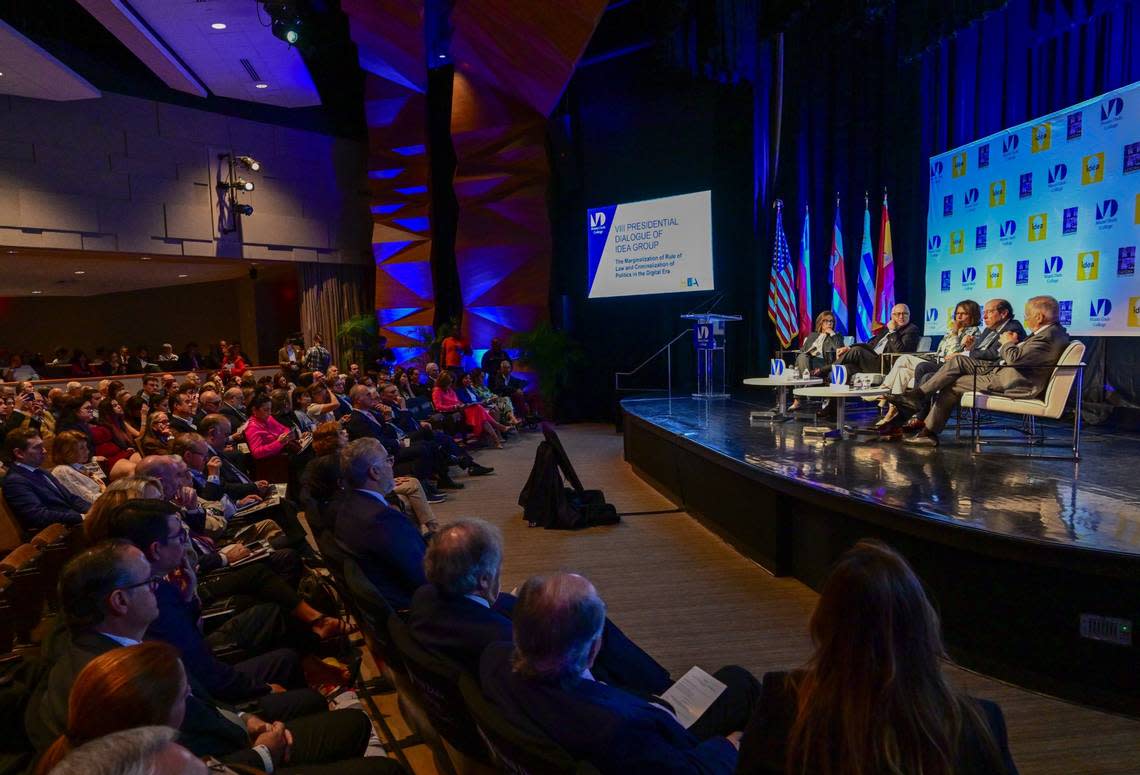World leaders meet in Miami Dade College to discuss democracy in the Americas

Miami Dade College was once again an advocate for global change when it hosted the Eighth Presidential Dialogue, an annual event that brings together former heads of state and opinion leaders from across Latin America and Spain to discuss democracy and its foundations.
MDC President Madeline Pumariega welcomed leaders, as well as a host of students, faculty and community members, to the annual program, held at MDC’s Wolfson Campus in downtown Miami on Tuesday. The date of the event coincided with the National Day of the Victims of Communism.
MDC organizes the event to encourage the exchange of ideas and enrich students’ learning experience beyond the classroom.
“It is important that our students have the opportunity to see what it means to be able to talk about democracy, understand freedom and, most importantly, have hope for the future,” Pumariega said.
Held in Spanish with simultaneous translation in English, the event featured two panel discussions under the theme “The marginalization of the rule of law and the criminalization of politics in the digital age.”
The first panel, “The political intervention of justice or the politicization of the judicial power”, moderated by the Content Director of NTN24, Idania Chirinos, was made up of former presidents Laura Chinchilla (Costa Rica), Osvaldo Hurtado (Ecuador), Andrés Pastrana (Colombia) and Miguel Ángel Rodríguez (Costa Rica).
Chinchilla suggested that most Latin Americans believe that leaders govern to benefit the elite. Decreasing that perception is essential, she said.
“If you are really interested in impacting the most vulnerable, the poorest and minorities, you can do it,” she said. “If we are able to invest more in them, I am sure that we will have more support for democracy.”
The second panel, “Political representation in the era of networks and the legal and judicial control of digital governance”, moderated by the director of Noticias RCN, Claudia Gurisatti, began with a presentation by Dr. Asdrúbal Aguiar, executive director of Democratic Initiative of Spain and the Americas. Among the panelists were former presidents Iván Duque (Colombia), Luis Alberto Lacalle (Uruguay), Jamil Mahuad (Ecuador), Sebastián Piñera (Chile) and Jorge Tuto Quiroga (Bolivia).
Piñera said the instant nature of social media can change public opinion more quickly than ever. Emerging technologies, such as artificial intelligence, can reshape perceptions of truth, increasing the vulnerability of democracy in the digital age, he added.
Other speakers included Luis Almagro, secretary general of the Organization of American States; José María Aznar, former president of Spain and president of the Institute of Atlantic Studies; María Corina Machado, presidential candidate and former deputy of the National Assembly of Venezuela; and Dr. Nelson J. Mezerhane, editor of Diario las Américas. Journalist María Elena Salinas, from ABC News and a former Univision anchor, served as master of ceremonies.


